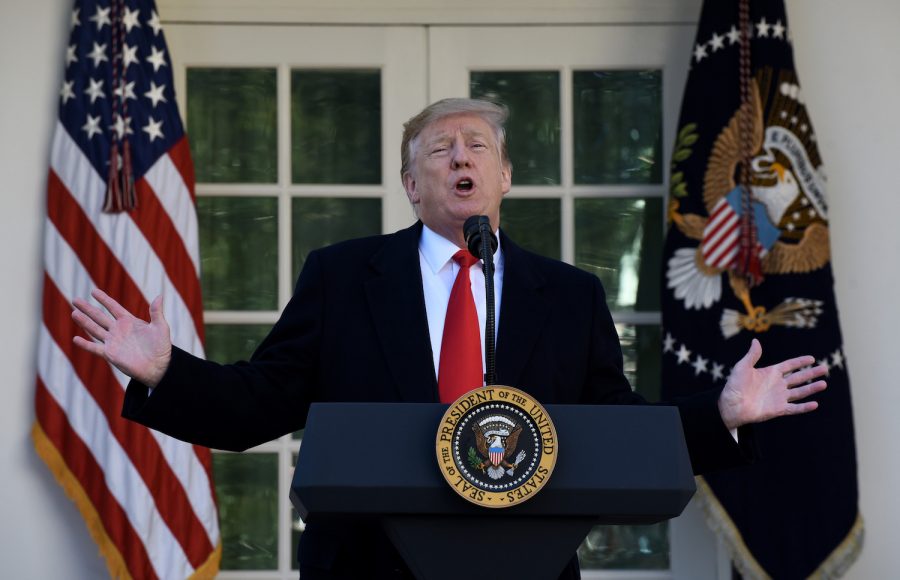Iowa Republican leaders: Iowans sticking to Trump despite not canceling caucus
With three public primary challengers, President Trump is still holding on to vast support in Iowa and nationally, party leaders and polling show.
Olivier Douliery/Abaca Press/TNS
President Donald Trump makes a statement announcing that a deal has been reached to reopen the government through Feb. 15 during an event in the Rose Garden of the White House Jan. 25, 2019 in Washington, D.C.
September 12, 2019
The Iowa Republican Party is holding onto plans to have its traditional straw poll at the caucus in February to decide the Republican nominee in the bid for the White House. Still, local party leaders maintain that the party firmly supports President Trump.
Muscatine County Republican chair Fred Grunder said the party is behind Trump, but there is likely to be a small number of protest votes at the caucus in 2020.
“There are some people that I think they’re just trying to make a statement more than anything else,” he said. “If there’s 500 people that are at our caucus, there will be 10 votes for the other guys.”
Four statewide Republican parties — South Carolina, Kansas, Nevada, and Arizona — have decided to forego a 2020 primary and commit their delegates to incumbent Trump. However, Republicans in Iowa have always planned on holding their straw poll, said the Iowa Republican Party’s communications director Aaron Britt.
“Since last November when people started first turning away from the midterms and looking toward the caucuses, we had said that we plan on holding a caucus,” he said. “And nothing has changed since then. It’s always been in our plans.”
During presidential election years, caucusgoers express candidate preference in the Republican caucus with a straw poll. Britt said since some Republican challengers have announced, Republicans decided to hold the straw poll at the caucus.
Trump faces three announced primary challengers in 2020. Former Massachusetts Gov. Bill Weld was the first to announce his candidacy in April. Former U.S. Rep. Joe Walsh, of Illinois, and former South Carolina Gov. Mark Sanford launched their presidential-nomination bids in the past month.
Trump’s challengers stand virtually no chance of success in the primary by most accounts. The president enjoys 88 percent approval rating among Republicans according to recent Gallup polling, and Britt said Iowa reflects the national trend.
“I think the support for the president here is very strong,” Britt said. “And that’s another reason why we want to hold the caucuses, because we want to show the rest of the nation that President Trump is still enjoying a broad amount of support here in Iowa.”
RELATED: Democratic National Committee recommends not to approve virtual caucus
According to a March Des Moines Register poll, Trump had an 81 percent approval rating among Iowa Republicans. In the same poll, 40 percent said they hope Trump faces a primary challenger.
Britt said support for Trump in Iowa is still strong because his challengers haven’t made a personal connection with Iowa Republicans. Because a caucus is more involved than a primary, Britt said, candidates have to campaign in the state to win over voters.
Incumbent presidents have faced more serious primary challengers in the past, University of Iowa political science Associate Professor Timothy Hagle said. Gerald Ford, Jimmy Carter, and George H.W. Bush all had challengers that won a significant amount of the popular vote in the primaries as incumbents.
What separates those cases from 2020, Hagle said, is that there was some problem — usually a poor economy — that caused disdain for the incumbent. The challengers in those cases were also “A-list” candidates, while Trump’s challengers are not as relevant in the Republican Party.
For Trump to face a serious contender in the nomination process, Hagle said there would need to be some sort of crisis event that an opponent could capitalize on.
Hagle said he doubts any of the three challengers could run a successful campaign, even if the economy tanks. He said a successful challenger would have to be someone that has more popularity among the party.
“I don’t think that, if something bad happened, that Republicans would be left with those three choices,” he said. “Somebody else would probably jump in that would be a better candidate, or at least somebody more appealing and better known to Republicans. But right now, it’s Trump’s nomination.”



